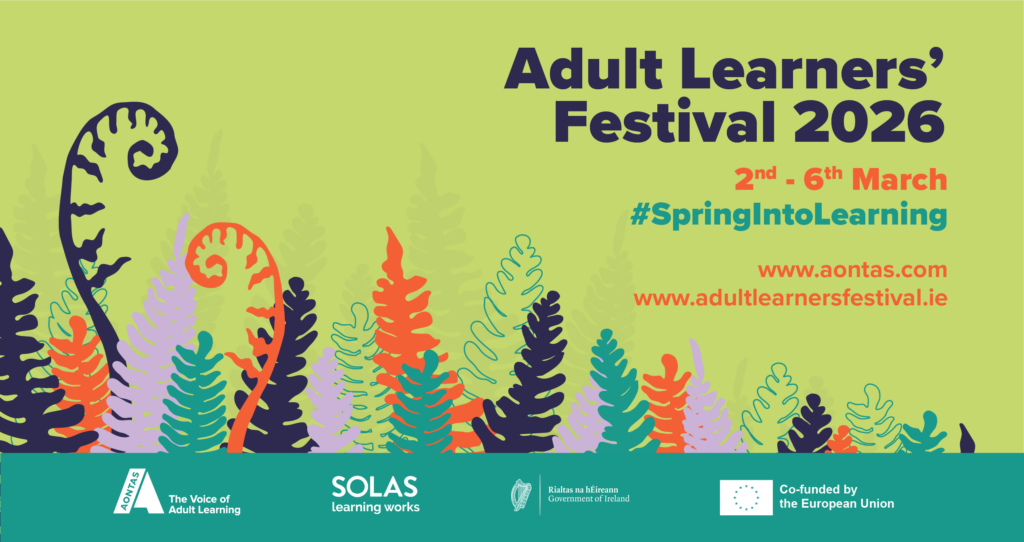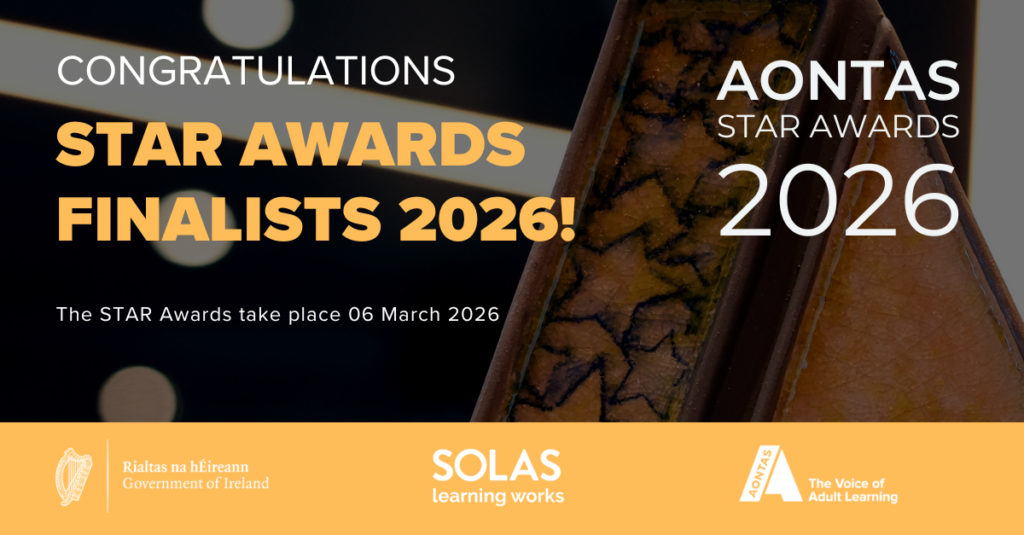AONTAS welcomes the publication of Adult Literacy for Life: A Ten Year Adult Literacy, Numeracy and Digital Literacy Strategy (08.09.2021). This is an important milestone for the sector and shows a strong commitment to educational equality. This Strategy represents a collective vision to tackle systemic adult literacy, numeracy and digital skills issues, with a whole of government approach that aims to ensure the needs of learners are recognised and addressed.
In December last year AONTAS produced a submission, in response to a public consultation process led by SOLAS the Further Education and Training Authority, providing key recommendations based on the views of adult learners and the expertise of our membership in order to support the development and success of the new Strategy.
Learner Centered Approach
AONTAS welcomes the learner centered approach in the strategy. In keeping with our learner voice work through the National Further Education and Training (FET) Learner Forum, we know that learners must be consulted as part of the decision making process, to ensure the best provision and supports that meets their needs.
AONTAS CEO Niamh O’Reilly said: “We welcome the publication of Adult Literacy for Life. It is vital that lifelong learning landscapes, including Education and Training Boards (ETBs), community education and libraries, come together to keep the needs of the learner at the centre of their provision.”
The Vital Role of Community Education in supporting Adult Literacy, Numeracy and Digital Skills for All
We are pleased to see community education named in the strategy as a key actor, offering a “range of literacy, numeracy, digital skills development and other courses and supports” (p.70). As outlined in our submission, AONTAS believes that the role of community education provision in Ireland is an essential for engaging those left behind and out of traditional formal educational structures. The community education sector caters to the learning needs of local communities and individuals in the target group.
Community education addresses educational and social inequality, particularly for women, and in doing so meets a multitude of national policy priorities; including but not limited to increasing lifelong learning participation rates, improving qualifications and skills for employability amongst the most underqualified members of society, improving social inclusion, and improving mental health and well-being.
A major reason why community education is so successful in addressing educational inequality is because it is learner-centred, supporting people to build their confidence and learning to learn skills, including ALND skills.
Findings from the recent AONTAS Community Education Network (CEN) Census reiterate the profound role that community education providers take in supporting those with additional literacy and numeracy needs. While providing a range of courses designed to support learner needs in these areas specifically, many respondents were also found to be providing additional free supports to learners who wanted to improve their literacy and numeracy. 42% of groups responding to the CEN Census offered additional free literacy support to learners in 2019/20. The availability of these complimentary supports at a local level is clearly invaluable in enabling learners who are traditionally furthest from education to pursue their learning ambitions. Community education also has a track record of supporting digital literacy, which was cited as an objective of 32% of accredited courses and 15% of non-accredited courses reported in the CEN Census.
Targeted Funding Support Schemes
AONTAS also welcomes that the strategy seeks to “Continue to build targeted funding schemes to support the community education and community development role in addressing the digital divide and supporting people with literacy needs” (p.56). Targeted funding support schemes such as the Mitigating Against Education Disadvantage Fund have provided vital and much needed resources for the community education sector.
During the COVID-19 pandemic demand for various kinds of literacy services has increased. 24% of providers reported an increase in demand for literacy support broadly in response to the CEN Census. Support for digital literacy has also been crucial in continuing to engage those who experience barriers to learning due to digital poverty, with 67% of groups responding to the CEN Census reporting an increase in demand for additional IT support. Many devices were made available through laptop loan schemes funded though the MAEDF, yet as one practitioner noted in a focus group with AONTAS: “you can give technology in the form of a laptop, but that is not access”. During the pandemic providers sought to provide greater access by introducing a range of innovative courses and workshops including Basic Digital Skills courses, Zoom training, and iPad training. Continuing to support learners to further develop their literacy and digital literacy skills is fundamental to providing access to education, particularly in these times, with 89% of survey respondents indicating that digital literacy training for learners was either “important” or “critical” in the wake of COVID-19.
AONTAS believe that all adults should have the right to fulfil their potential in order to create a more equal society and we fully support the implementation of this Strategy.
You can access the full Adult Literacy for Life report here: https://www.adultliteracyforlife.ie/f/120607/x/133e8d1481/15607_all_strategy_web.pdf





